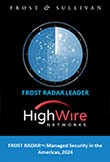
Cybersecurity. Just the mention of it can cause either panic or fatigue. As a data- and internet-dependent society, few individuals – and even fewer businesses – can function without it. Many customers don’t understand the nuances of cybersecurity. It used to mean setting up a firewall and calling it a day—a level of protection easily understood by many customers, especially SMBs – but the days of simple defenses have passed. Today’s cyberthreats are complex and overwhelming to many business owners and managers.
Managed cybersecurity services offer a timely and highly valuable solution that MSPs can use to help their business customers achieve security and resilience in today’s landscape. End-to-end security solutions MSPs can bundle for their customers include:
- SaaS Application Access Control
- Open Extended Detection and Response (Open XDR)
- Endpoint Detection and Response
- Managed Firewalls
- Ransomware Kill Switch
- Network Detection and Response
- Patch Management
- Security Awareness Training
- Zero-trust Security
- Vulnerability Management
All in, MSPs can deliver cutting-edge, turnkey security services that meet the needs of businesses of all sizes—from SMBs to enterprise customers.
MSP Considerations for Selling Cybersecurity
Your prospects need to protect their business, their employees and their customers. That’s a given. But often, the solutions seem more overwhelming than the actual threats. For this reason, some MSPs are hesitant to roll out cybersecurity solutions. That’s a mistake. Here are four reasons why:
- Cyberthreats are a top concern among your customers. Helping your customers protect themselves from cyber threats builds trust and loyalty.
- Cybersecurity services add lucrative recurring revenues to your portfolio. Selling security services is excellent for both add-on revenues across your customer base and opening doors to new clients.
- Adding cybersecurity services protects your customer base from competitors. And it helps to protect your MSP customer base from poachers that offer security solutions in their product portfolios.
The right supplier partner, designed to serve MSPs and their customers, makes it easy to offer security solutions. You can easily deliver cutting-edge managed cybersecurity services to your clients in the right cybersecurity partnership.
Why Cybersecurity is so Important to Your Customers
At this point, most business owners and managers know that cyberattacks are a matter of “when” and not “if” they occur. The costs of downtime and reputation due to an attack or a breach are considerable. And they genuinely fear ransomware.
It’s also important to realize that SMBs are now primary targets for hackers. That’s because even though they’re small, they have:
- Sensitive data, including medical records, credit card and bank account data and personally identifying information.
- Cash that can be stolen directly or targeted through ransomware attacks. These days it’s ransomware that keeps your customers awake at night.
- Connections to larger companies. Supply chain, information-sharing and transaction-processing relationships offer attack vectors into larger organizations.
Common MSP Objections to Selling Cybersecurity
The primary reason some MSPs are hesitant to sell cybersecurity services is perceived complexity— particularly with unbundled solutions. They worry that:
- Learning about cybersecurity solutions and keeping current on them is too large and time-consuming for their MSP to take on.
- Educating clients about cybersecurity solutions will be challenging.
- The responsibility of deploying and maintaining solutions will overwhelm their organizations.
The key to all of these potential challenges is to partner with a managed security solutions provider that serves MSPs and their customers. The right partner can provide:
- A full suite of managed security solutions that simplify sales and support processes.
- Sales and technical training to help your team come up to speed on all things security.
- Sales and marketing materials to help you generate leads and close business, including white-label or co-branded flyers collateral, videos, datasheets, battle cards, turnkey campaigns, etc.
- Sales engineering and closing support when you need it.
- A Security Operations Center (SOC), staffed with security professionals to provide round-the-clock monitoring and response services to your clients.

How to Market and Sell Cybersecurity Services
There is nothing more important than a first impression. In business, your first impression is usually made through marketing, long before you and a potential customer ever meet face to face. We’ve put together this guide to help you think through the ins and outs of both marketing your cybersecurity services and making the sale once you’ve made contact with a potential customer.
- Understand your customer
- Discover your niche
- Build trust
- Emphasize integration
- Educate potential customers
- Focus on outcomes
Understand your customer
One of the most important steps in marketing security services is knowing your customer. Who are you selling to? There are two ways of looking at potential customers: industry and size. If you are marketing to multiple industries, you need to understand what sets these businesses apart from one another. For example, healthcare and financial industries have many more regulations than a company that deals in consumer goods. Then, you must consider a company’s size.

You should understand these differences and how they impact potential customer needs.
Discover your niche
Some businesses try to be all things to all customers, but that also makes it hard to stand out. To take your business to the next level, consider honing your strengths and concentrating on a niche that makes you unique in the market. Examine the commonalities among your current clients, their industries, and their needs. Of your current security services, where do you find that you really shine? Are you passionate about endpoint security solutions and IT security? Perhaps you are helping a lot of your existing clients with phone security. Discovering your niche allows you to better understand your client’s needs and to provide the specialized support that will make you stand out.
Related reading: Why is healthcare security important for the healthcare sector?
Cybersecurity is not an option: Five industries most vulnerable to attacks online
Build trust
Security can be a sensitive subject, especially if a business is coming to you fresh from a data breach or other cybersecurity challenge. Take time to understand their needs. What drives their business? What has brought them to the point of seeking outside security services? Listening is key. When you are able to balance your industry knowledge with an understanding of the client’s concerns, you can establish a trusting relationship.
Additionally, customers will be more trusting of someone with experience and professionalism. As you develop your business, take the time to build a relationship with each customer. The more trusting customers you have, the more likely that new customers will see you as worth trusting, as well.
Related: Top 5 cybersecurity marketing challenges and how to overcome them
Emphasize integration
Many potential customers are intimidated by the thought of implementing new security solutions. They fear that the process will be intrusive, expensive, and complicated to learn. The very thought of implementation disrupting their workflow for weeks on end is enough to put off many prospective clients. (Continuum shares How to overcome objections when selling managed services.) By highlighting the simple ways that security solutions can be integrated into existing infrastructures and processes, you can help to shift the focus from challenges to possibilities. By emphasizing the process, you can help customers understand how their business will adapt to a new security paradigm.
Keep in mind that all clients are different. While some clients are satisfied with the plan you lay out, others will continually seek more information and planning before they feel confident to commit (Check out these 5 secrets to managed security services selling success). Some customers will want to develop a threat model and require forecasting and surveillance of the market for other breaches. Understanding what each client needs and what you are willing to offer will help ensure that the relationship is successful.
Related reading: Solution Spotlight: Mastering the art of selling managed security services as an MSP
Educate potential (and existing) customers
Yet, cybersecurity threats are ever-present and changing all the time. As a result, potential and existing customers need to be educated about what threats they face and what solutions you offer. Existing customers need to understand new and evolving risks and how your security services and solutions will adapt to meet them. Take the opportunity to inform and educate how to spot common threats, and empower your clients to take the next step to protect their business against potential future threats.
Focus on outcomes
Security is not a checkbox and it is not just about big events. Security services are about keeping businesses focused on what they care about: their business and offloading the security operations to your expert hands. This is your opportunity to share your value proposition. Security service is about business efficiency just as much as it is about risks. The outcome of a security agreement is knowledge, preparation, and readiness. Potential deliverables for a business will be a disaster recovery plan, a training program and upgrade system. Further, as a part of this preparation, clients will gain new insights into their business by evaluating their weak points, the priorities of each of their systems and what their assets are so that they can develop a thorough and rigorous plan with their security partner. It is also worth considering the monetary outcomes for these businesses. For many businesses, there is a definite return on investment by adding outsourced services like SaaS-based security, cybersecurity, SOCaaS, and cloud monitoring. These plans and rubrics and programs are all concrete outcomes of a security relationship, but there is something more: peace of mind.
Related reading: How SOCaaS improves your margins
6 things to look for in a SOCaaS partner








Leave a Reply